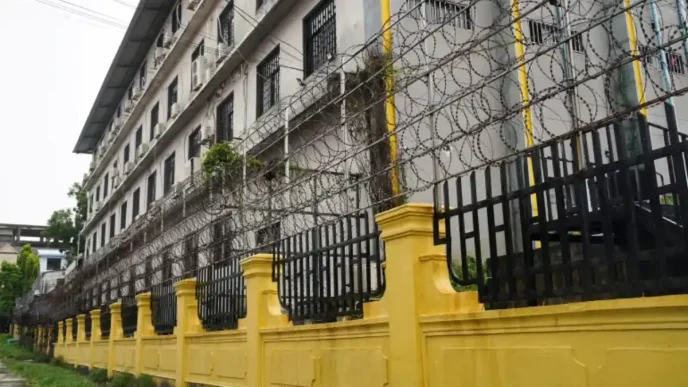In the heart of central Vietnam, Hà Tĩnh Mental Health Hospital stands as a stark reminder of the nation’s overlooked mental health crisis. Here, amidst overcrowded wards and outdated equipment, medical staff battle daily to care for patients with severe psychological conditions—often at great personal risk. From violent outbursts to heartbreaking abandonment, the challenges are immense, yet the dedication of healthcare workers like Lê Thị Quỳnh Nga, Deputy Head of the Acute Female Ward, shines through the chaos. “It’s not like treating ordinary patients” she says, reflecting on a job that demands both physical endurance and emotional resilience.
As mental health issues surge across Vietnam, driven by modern societal pressures, facilities like Hà Tĩnh struggle with critical shortages of staff and resources. This underfunded outpost of care reveals a broader systemic failure—one that leaves both patients and caregivers vulnerable. With rising cases of depression, anxiety, and psychosis, the question looms: can Vietnam’s healthcare system rise to meet this growing need?
A Daily Battle for Care
At Hà Tĩnh Mental Health Hospital, the environment is anything but ordinary. Patients range from those grappling with severe agitation and schizophrenia to individuals with congenital mental impairments. Each case requires tailored attention, a task made harder by unpredictable behavior. Lê Thị Quỳnh Nga, who has spent over a decade at the hospital, describes the routine risks staff face. “We face risks and bizarre situations daily. Being attacked, hit, or even soiled by these patients is routine” she says. Torn clothes, insults, and physical assaults are part of the job, yet Nga and her colleagues persist, driven by a deep sense of duty.
The emotional toll is evident. Staff often witness heartbreaking scenarios, such as families abandoning patients at the hospital gates, leaving caregivers to step in as surrogate family. During aggressive episodes, wards descend into chaos as workers restrain patients and administer medication. When patients flee, doctors and nurses become search parties, doubling as listeners and emotional anchors. “After spending time with them, I realise how pitiful their situations are” Nga reflects, a sentiment that has kept her in this grueling role for years.
Personal Sacrifices and Compassion
Beyond the physical dangers, the financial and emotional burdens on staff are staggering. Many use their own money to support patients who lack family support or cannot afford basic necessities like food. For some patients, the hospital becomes a second home, with stays stretching over years. Nga recently checked on L.T.H., a 38-year-old schizophrenic patient from Thạch Hà District, who has relied on the facility for six years. Spending 15 to 20 days per visit before returning home with medication, L.T.H.’s circumstances—unmarried and responsible for a child—place an immense strain on her accompanying mother, a reality Nga understands deeply.
Newer staff, like 23-year-old nurse Võ Thị Thanh Huyền, also feel the weight of the job. In her sixth month at the hospital, she finds the work taxing yet rewarding. “It’s tough, but I find joy in it. Understanding their struggles makes me feel for them” she says. This connection to patients’ struggles fuels a quiet determination among the team, even as they navigate daily challenges with limited support.
Risks Without Reward
The dangers of the job are not just emotional. Nguyễn Tiến Hùng, Head of the Acute Male Ward, recounts a recent incident where a patient gripped his throat during a psychotic episode. Caught off guard while holding a pen and paper, he relied on colleagues and security to intervene. “I couldn’t react in time, but I’m used to it. Colleagues and security stepped in to help” he says. After 31 years in psychiatry, Hùng has developed techniques to manage violent outbursts, though unexpected incidents—like one that left a scar on his face—still occur.
Managing 40 to 60 patients daily, often alone due to staffing shortages, Hùng works without breaks. The lack of sufficient support or protection leaves staff vulnerable, especially since patients cannot always control their actions. “Success here requires firmness and authority, fear or hesitation would drive anyone away” he notes. His family’s understanding—his wife and children are also in healthcare—has sustained him through over three decades in this demanding field.
A System Under Strain
The challenges at Hà Tĩnh are symptomatic of a larger crisis in Vietnam’s mental health care system. Deputy Director Nguyễn Văn Mạnh highlights a severe shortage of specialized staff and resources. As mental health issues rise—spurred by modern pressures affecting everyone from farmers to professionals—the hospital struggles to keep up. Overcrowded wards and outdated equipment compound the problem, while recruiting psychiatrists remains a near-impossible task. “Life’s pressures are increasing mental health issues” Hùng observes. “We need more manpower and infrastructure to cope” he adds.
Vietnam’s rapid urbanization and economic shifts have brought new stressors, contributing to a growing incidence of mental health disorders. Yet, public awareness and funding for mental health remain limited. Facilities like Hà Tĩnh, often under-resourced and overstretched, bear the brunt of this gap. If unaddressed, experts warn that the strain on such hospitals could deepen, leaving more patients without adequate care and staff without the support they desperately need—though these projections remain unconfirmed pending official data.
A Call for Change
The story of Hà Tĩnh Mental Health Hospital is one of resilience in the face of systemic neglect. The staff’s grit and generosity hold the line, but for how long? As societal stress continues to drive up mental health cases, Vietnam faces a critical juncture. Will the government and society prioritize mental health care, investing in infrastructure and personnel to meet this urgent need? Or will facilities like Hà Tĩnh remain underfunded outposts, reliant on the sheer willpower of their caregivers?
For now, the silent struggles of patients and staff at Hà Tĩnh serve as a poignant reminder of the human cost of inaction. Their stories—of dedication amidst danger, compassion amidst chaos—demand attention, urging a national reckoning with a crisis too long ignored.














